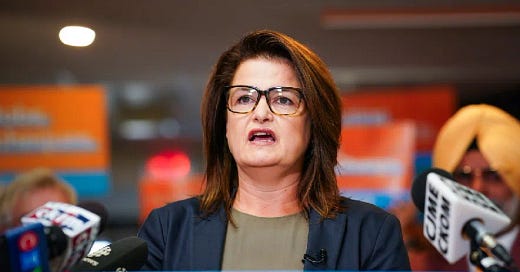Beck has lit a fire, and it’s not going out anytime soon
Saskatchewan NDP Leader Carla Beck didn’t get the majority she deserved, but there is rarely justice in politics.
As polls closed last Monday night, the Saskatchewan NDP had its eyes on a handful of key seats that would determine the election outcome: an impressive growth campaign or a historic victory over a long-entrenched conservative dynasty.
At around 10:30 p.m., a tranche of results from our scrutineers arrived. I looked up at Carla Beck, leader of the Saskatchewan NDP, and quietly told her, “We’re going to lose both Moose Jaws.” In that moment, though we didn’t say it aloud, we both understood that the narrow path to victory we had painstakingly built over the last two years and fiercely fought for the past four weeks was slipping beyond reach.
Ultimately, the NDP fell 4 seats short of a majority. Yet, 27 seats is an extraordinary result. The Saskatchewan NDP has more than doubled its 2020 result and marked significant growth outside the cities, a remarkable comeback and the party’s best showing since 2003. Still, when Carla Beck addressed supporters on Election Night, she was visibly disappointed- she wanted the chance to govern, and she had come so close.
The NDP’s surge may have surprised some, but behind the scenes, things were falling into place exactly as planned- a rarity in politics. It started with two early goals: First, chip away at Scott Moe’s sky-high approval rating and second, make sure every person in Saskatchewan knew Carla Beck. Carla became NDP Leader in 2022, and research showed us that when people met her, they liked her. Through a well-executed earned and paid media strategy from a scrappy punch-above-its-weight team, the NDP made significant progress on both of these goals.
By the summer of 2024, the campaign was gaining serious momentum. Polls showed steady growth in NDP support as Sask Party numbers declined. ‘Time for change’ sentiment had grown across the province as the Sask Party approached 17 years in office, and things that people cared about most, healthcare and affordability were in crisis and getting worse. However, there was one thing holding voters back from supporting the NDP- they were worried that at the height of an affordability crisis, that Carla Beck would raise their taxes.
Rather than run from its weakness, the NDP took this head-on, with an unequivocal commitment not to raise taxes in late August. We spent the next four weeks rolling out detailed, costed platform commitments on the economy, healthcare, affordability and education. By the time the writ dropped on October 1st, the NDP was in the novel position of having already laid out its election vision uncontested.
October was a battle for hearts, minds, and air time. Carla Beck exceeded all expectations in the Leader’s debate, standing toe-to-toe with the incumbent premier and showing herself as a tough, no-nonsense leader with clear plans for the future. The very next day, in response to a conveniently asked question, Scott Moe promised Saskatchewan that policing the gender of children in school changerooms would be his top priority.
The transparent attempt to use division and culture war to distract from more pressing issues backfired. Voters saw through the attempt to change the channel for what it was. Meanwhile, Carla Beck stuck to her message, her priorities and her election game plan.
As the NDP vote share continued to grow, so did the optimism inside the campaign. At this point, it would have been easy to stick to the safe plan of a growth election and then take a victory lap when it exceeded expectations, but instead, Beck doubled down, leaned into the longer shot and ran for government -- and in that moment she allowed Saskatchewan’s looking for change, to hope.
The Sask Party’s campaign was nearly identical to their 2020 strategy: low-budget ads, divisive rhetoric, and a well-worn attempt to stir up a culture war to rally their base. While no one can deny their campaign was effective, this election wasn’t easy for them. The NDP’s dominance in Regina and Saskatoon shows that, in times of crisis, voters want more than talking points and finger-pointing. Beck offered concrete solutions to the province’s toughest challenges, and her campaign was one of integrity and optimism.
In the end, it wasn’t enough. Beck didn’t get the majority she deserved, but there is rarely justice in politics. The NDP fell short of victory, but the party is now filled with renewed vigour. With the largest Official Opposition the province has seen in decades and a growing base of support, the NDP can’t become complacent. We must double down in the cities and find ways to reach into rural ridings to position ourselves as the hopeful voice of Saskatchewan’s future come 2028. That shouldn’t be hard, Carla Beck has lit a fire, and it’s not going out anytime soon.



